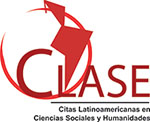Determinantes de los programas de educación financiera de los bancos privados del Ecuador. Caso Banco de Loja, Ecuador
DOI:
https://doi.org/10.23857/dc.v5i2.903Palabras clave:
Banco de Loja, Ecuador, educación financiera, conocimientos financieros.Resumen
El presente trabajo de investigación pretende analizar los determinantes de los programas de educación financiera de los participantes durante el año 2017, caso Banco de Loja. Para ello se considera el anólisis de los conocimientos financieros en función del sexo y cobertura del programa. La metodología utilizada en el presente artículo seró la aplicación de técnicas econométricas mediante la estimación de un modelo logit con efectos marginales, de los resultados se obtiene que en cuanto a los conocimientos financieros de los capacitados las mujeres tienen menos probabilidad de ahorrar que los hombres y en cuanto a la cobertura de los programas de educación financiera los capacitados de Zamora tienen menos probabilidades de ahorro que los capacitados de Loja.
Citas
Almenberg, J., & Dreber, A. (2012). Gí©nero stock market participation and financial literacy, (737), 17.
Atkinson, A., & Messy, F. (2015). Financial Education for Long-term Savings and Investments, (39), 2015.
Atkinson, A., & Messy, F.-A. (2012). Measuring Financial Literacy: Results of the OECD / International Network on Financial Education (INFE) Pilot Study. OECD Working Papers on Finance, Insurance and Private Pensions, (15), 1–73. https://doi.org/http://dx.doi.org/10.1787/5k9csfs90fr4-en
Barcellos, S. H., Smiyh, J. P., Yoong, J. K., & Carvalho, L. (2012). Financial Literacy Center Barriers to Immigrant Use of Financial Services Expectations REPORT TO THE SOCIAL SECURITY ADMINISTRATION, (5), 60.
Bruhn, M., & Love, I. (2014). The Real Impact of Improved Access to Finance : Evidence from Mexico, 1–59.
Carpena, F., & Zia, B. (2011). Unpacking the causal chain of financial literacy importante, (September), 36.
Coates, K. (2009). Educación financiera: Temas y desafíos para Amí©rica Latina.
Comití© Económico y Social Eurepeo CESE (2013). Educación financiera para todos; estrategias y buenas prácticas de la eduación financiera en la Unión Europea. Editorial unidad de visitas y publicaciones.
García, N., Grifoni, A., López, J. C., & Mejía, D. (2013). La educación financiera en Amí©rica Latina y el Caribe Situación actual y perspectivas (CAF).
Grifoni, A., & Messy, F. (2012). Current Status of National Strategies for Financial Education, (16), 36.
Guiso, L., & Jappelli, T. (2008). Financial Literacy and Portfolio Diversification. CSEF Working Paper No. 212, (January), 1–36. https://doi.org/10.1080/14697680902878105
Jappelli, T., & Padula, M. (2013). Investment in financial literacy, social security and portfolio choice, (Mayo), 56. https://doi.org/10.1007/s10273-011-1262-2
Kiliyanni, A. L., & Sivaraman, S. (2016). The perception-reality gap in financial literacy: Evidence from the most literate state in India. International Review of Economics Education, 23, 47–64. https://doi.org/10.1016/j.iree.2016.07.001
Lusardi, A., & Tufano, P. (2009). Debt literacy, financial experiences, and overindebtedness, 49. https://doi.org/10.1007/s10273-011-1262-2
Lusardi, A. (2008). Financial Literacy: An Essential Tool For Informed Consumer Choice? Journal of Chemical Information and Modeling, 29. https://doi.org/10.1017/CBO9781107415324.004
Lusardi, A., Michaud, P., & Mitchell, O. S. (2011). Optimal Financial Literacy and Saving for Retirement ∗, (septiembre), 1–40.
Lusardi, A., & Mitchell, O. S. (2007). Financial Literacy and Retirement Preparedness: Evidence and Implications for Financial Education. Business Economics, 42(1), 35–44. https://doi.org/10.2145/20070104
Lusardi, A., & Mitchell, O. S. (2013). The economic importance of financial literacy. Journal of Economic Literature, 52(1), 65.
Lusardi, A., & Mitchell, O. S. (2014). The Economic Importance of Financial Literacy: Theory and Evidence, 52, 1–40.
Miller, M., Reichelstein, J., Salas, C., & Zia, B. (2014). Can You Help Someone Become Financially Capable? A Meta-Analysis of the Literature. The World Bank Research Observer, (Junio), 1–77. https://doi.org/10.1093/wbro/lkv009
Roa, M (2013) Inclusión financiera en Amí©rica Latina y el Caribe: Aceso, uso y calidad. Publiado por bolertín CEMIA, julio-septiembre 2013
SBS. (2015). Normativa Programa Educacion Y Cultura Finanicera. Quito.
Van Rooij, M. C., Lusardi, A., & Alessie, R. J. (2011). Financial literacy, retirement planning, and household wealth, 44.
Xu, L., & Zia, B. (2012). Financial Literacy around the World: An Overview of the Evidence with Practical Suggestions for the Way Forward. Policy Research Working Paper, (6107), 1–56. https://doi.org/10.3102/00346543067001043
Publicado
Cómo citar
Número
Sección
Licencia
Authors retain copyright and guarantee the Journal the right to be the first publication of the work. These are covered by a Creative Commons (CC BY-NC-ND 4.0) license that allows others to share the work with an acknowledgment of the work authorship and the initial publication in this journal.







